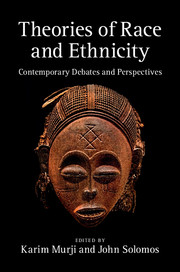15 - Conclusion: back to the future
Published online by Cambridge University Press: 18 December 2014
Summary
This book opens with a discussion of race and racism in a new genomic era and concludes with a debate about method in the study of ethnicity and race. In between these two poles, the chapters in this volume have examined ethnicity, race, post-race and racism across a range of national contexts, chiefly the USA but also France and the United Kingdom. The coverage in this volume – such as mixed-race identities, critical race feminism and intersectionality, sexualities, psychoanalytical and performativity perspectives, critical rationalism and critical whiteness studies – offers an insight into the extent and variety of lively debates and investigations in contemporary race theorising and research. This summary reflects the organisation of this book around a range of contemporary debates and perspectives. Although no book can provide a comprehensive global outlook on the wide and expanding scope of debates and perspectives in which ethnicity, race and racism are key issues, the array of views in this book is intended to highlight a number of key questions in their study. Collectively, the chapters underscore one of these: the extent to which there is recurring and continuing debate about what race is and whether it can, or should, be transcended. This is a theme reflected across both parts of this book. Looked at as a whole, the chapters specify the multiple, sequential and contradictory processes at play in contemporary social science approaches to race.
- Type
- Chapter
- Information
- Theories of Race and EthnicityContemporary Debates and Perspectives, pp. 263 - 281Publisher: Cambridge University PressPrint publication year: 2014
References
- 1
- Cited by



